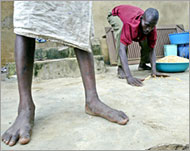Africa top priority as G8 leaders gather
Leaders of the world’s eight richest and most powerful nations have converged on a heavily guarded, luxury Scottish resort, facing the challenges of pulling Africa out of poverty and halting global warming.

Waiting for them on Wednesday are 5000 angry protesters who intend to march within shouting distance of Gleneagles to demand action from the club of industrialised nations’ 30th annual summit.
British Prime Minister Tony Blair, who will host the Group of Eight conclave, wants fellow leaders from Canada, France, Germany, Italy, Japan, Russia and the US to make bold moves on Africa and climate change.
He has invited not only UN Secretary-General Kofi Annan, but also the leaders of Brazil, China, India, Mexico, Nigeria, Senegal, South Africa and other key developing nations.
Blair’s finance minister, Chancellor of the Exchequer Gordon Brown – who regards the fight against poverty in Africa as a moral crusade – sought on Tuesday to ensure that expectations do not get too high.
“What Britain says is one thing,” he told BBC radio. “What we can persuade the rest of the world to do together is what we will get as the outcome of Gleneagles.”
Bob Geldof, the rock star turned activist behind the multi-city Live 8 concerts for Africa last Saturday, and another of Blair’s summit guests, said: “I don’t think the chancellor should try lowering the bar at this stage.
“We have come for victory,” added Geldof on a train for a special Live 8 follow-up concert in Scotland’s capital, Edinburgh, on Wednesday featuring stars such as Annie Lennox, The Corrs and Senegal’s Youssou N’Dour.
African demands
In a show of unity, African Union leaders agreed on Tuesday to a common list of demands to take to Gleneagles, including more debt relief, on top of a call for a full-time place for Africa in the UN Security Council.
 |
|
African Union leaders included |
Security was dramatically beefed up on Tuesday in and around Gleneagles, which is ringed with a double-layered, 8km fence studded with watchtowers, and 10,000 police on duty at Gleneagles and elsewhere in Scotland.
Military helicopters roamed the skies, while roadblocks and vehicle searches slowed traffic as police tried to collar would-be protesters.
“We will deal robustly with any people who want to break the law,” said Tayside police Chief Constable John Vine, whose jurisdiction takes in Gleneagles.
More than 200,000 people marched peacefully in Edinburgh on Saturday to demand G8 action on Africa, before things turned ugly on Monday when some protesters fought police in the capital with bottles and rocks.
Scores were arrested or hurt.
Protest approved
Wednesday’s march has a green light from local authorities, as long as it sticks to a route that will take it to 500m from Gleneagles’ main gates and no more than 5000 protesters turn up.
 |
|
The venue is ringed with a double- |
It is being organised by G8 Alternatives, a coalition of leftist groups that links G8 summitry and related international agencies such as the World Trade Organisation to unbridled globalisation and abuse of workers’ rights.
John Kirton of the G8 Research Group at the University of Toronto said Gleneagles could be the most successful summit since the G8 – then called the G6, with Canada and Russia yet to join – first met in Rambouillet, France, in 1975.
He said he expected “some move” from the G8 on drawing down export subsidies that make it virtually impossible for Africa’s farmers to sell their produce abroad – a key demand of the fight-against-poverty lobby.
Last month, G8 finance ministers set the tone for progress by agreeing to forgive $55 billion of crippling debt owed by poor African and Latin American states to international lenders such as the World Bank.
Climate change
On climate change, Kirton said that despite US President George Bush’s rejection of the Kyoto Protocol, the summit could see rising economic powers China and India inducted into a fresh initiative to curb greenhouse gases.
“Gleneagles is destined to say: ‘We’re all in this together, but we all have to act’,” he said.